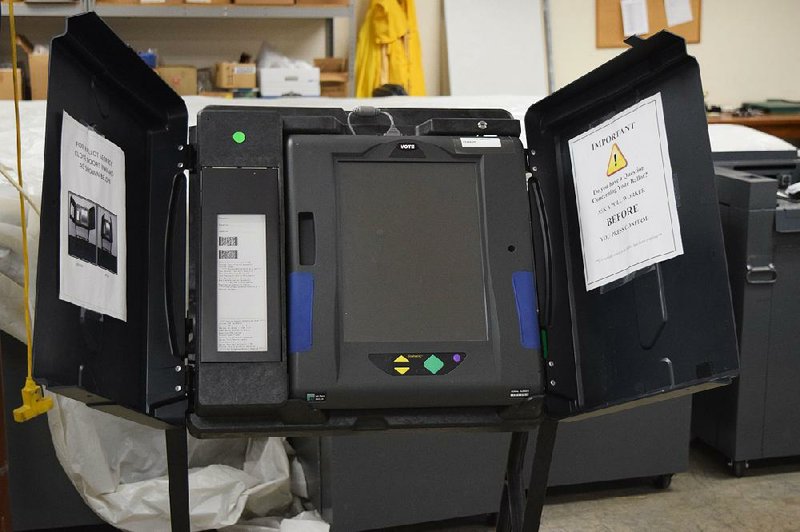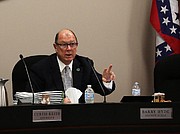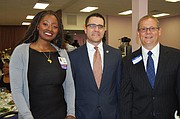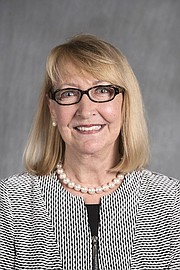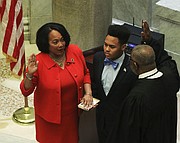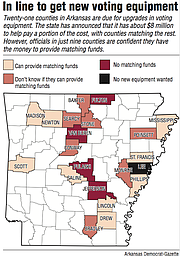Pulaski County officials are reviewing a roughly $1.56 million contribution needed to buy new voting equipment, funds they say aren't in the budget.
The payment -- which would be in addition to state funds set to be distributed to 21 counties through Secretary of State John Thurston's office -- has caught officials off guard, according to Barry Hyde, county judge of Pulaski County.
The state has asked the largest county by population to put up a dollar-for-dollar match, which is intended to split the purchase price of about $3.1 million in new voting equipment.
That's an issue for the county, its circuit clerk and its election commission, who say the expense isn't feasible at this time.
Pulaski County is among almost two dozen Arkansas counties that don't yet have new voting equipment, which 54 counties had in place in the November election.
Like Pulaski County, officials in Jefferson, Fulton and Van Buren counties said they can't afford their county's share of the cost of the equipment.
But officials in nine counties -- Drew, Lincoln, Madison, Mississippi, Newton, Phillips, Saline, St. Francis and Scott -- said they expect to be able to cover their share of the cost.
"We are going ahead and buying the equipment, because we have had so many problems with the voting machines breaking down," said Clark Hall, county judge of Phillips County, who expects the county's share of the cost to be about $62,000.
[NEWSLETTER: Sign up for the Arkansas Politics email at arkansasonline.com/emails]
"We are going to bite the bullet," said Hall, a former Democratic state representative from Marvell. "I don't think we have a choice."
Officials in seven counties -- Baxter, Bradley, Conway, Monroe, Poinsett, Searcy and Stone -- said they haven't determined whether they will be able to afford their respective contributions to match state funds.
"We just don't have $100,000 laying around anywhere," said Bradley County Clerk Karen Belin. "Right now, our election commissioners are looking to see if we can combine precincts and polling sites to reduce the number of machines."
But Lee County may not be buying equipment at all. Voters there prefer casting paper ballots over using touch-screen machines and the county's share of new equipment could be $25,000 to $40,000, so Lee County won't be buying new equipment, said its election coordinator, Jason Carter.
He said only one voter has used the county's four touch-screen machines during the past four years.
A PARTNERSHIP
Hyde, Pulaski County's chief executive, said in a recent interview that "at this point, we just don't really have [the matching funds] sitting around."
The match itself came as something of a surprise to Hyde, who said that while Pulaski County does have cash in its reserves, the use of most of those funds is restricted by state law.
The state funding was made possible by Act 808 of 2019, sponsored by Senate President Pro Tempore Jim Hendren, R-Sulphur Springs. The new law diverts $8.24 million in excess funds from the property-tax relief trust fund to the county voting systems grant fund.
Hendren told a House committee in late March that his proposal would help the 21 counties buy new voting machines, providing they pay matching funds.
In an interview last week, Hendren said, "We really feel it needs to be a partnership."
The senator said he has always believed there needs to be cooperation between state and local governments on matters ranging from school funding to turn-back money for local governments to financing new voting equipment.
He said the state funds give "all the opportunity to get the new machines for the next election."
"I hope they'll all be able to get there and it may take more than one election cycle to do that," said Hendren.
The transfer of the funds was announced Aug. 1 by Republican Gov. Asa Hutchinson. Some of the money was used to reimburse three counties -- Benton, White and Ashley -- $2 million, or half of what they paid for new equipment.
Fifty-four of the state's 75 counties had updated equipment by last November's general election. About $9.7 million from the secretary of state's budget, $4.4 million in one-time federal funds and $8.7 million from the counties covered the cost of that new equipment under deals brokered by then-Secretary of State Mark Martin's office, those officials said last year.
The new equipment replaces machines bought with federal funds under then-Secretary of State Charlie Daniels in 2006.
During a July 31 meeting at the Association of Arkansas Counties office, officials from several counties were divided about whether they could pay matching funds.
The office of the current secretary of state -- Thurston, a Republican -- had estimated that the states' and counties' share of the cost would be about $15 million.
15% DISCOUNT
On Aug. 22, Thurston announced he had negotiated a 15% discount on the purchase of new equipment through Nebraska-based Election Systems & Software.
Daniels and Martin also bought machines from the same company.
Thurston spokeswoman Kerry Moody said Friday an ExpressVote touch-screen voting machine is $3,480, a DS200 tabulator is $5,635, a pool book is $865 and an ExpressPass printer is $725 through the Nebraska company.
That doesn't factor in the 15% discount and trade-in allowances, she said.
The secretary of state's office hasn't drafted contracts with any counties "at this point," Moody said.
"Two of our employees, Elections Director Leslie Bellamy and Administrative Director Kurt Naumann, are both traveling to counties currently to advise them on their individual election equipment scenarios," she said in a written statement.
Moody said that "the state's shared cost is static. ... However, as we are visiting with each of the 21 counties, some of them are editing the number and type of equipment needed."
For instance, if a county decides to use vote centers, its equipment needs will change and could save significant funding, she said.
Chris Powell, Thurston's spokesman, said there is no deadline for counties to decide whether they can afford their share of the cost.
"As counties are ready to proceed, the equipment will be installed as soon as practical," Powell said. "We hope to have some of these counties up and running in time for the March [3] primary."
The possible increased use of vote centers has been predicted by Susan Inman, who is a former elections director in the secretary of state's office and former Pulaski County election official. She ran twice for secretary of state, losing to Martin in 2014 and Thurston in 2018.
Inman wrote on the Progressive Arkansas Women PAC's blog that there is a "little inside secret. The [secretary of state's office] will bargain with those poorer counties needing new machines to reduce polling locations and thus the number of machines needed. The [office] will push counties to create Vote Centers, which reduce voter access and turnout."
Powell replied, "No comment."
FUNDING FORMULA
Officials in at least a few counties object to Thurston's office's formula for determining how much a county must pay in matching funds.
The formula factors in poverty rate, per-capita income, unemployment rates and population change. It is based on variables used by the Arkansas Economic Development Commission, according to Naumann of Thurston's office.
As of July 31, the state's share ranges from 50% to 78%, the latter in Phillips County. The average matching rate is 55%, Naumann said.
In Van Buren County, County Judge Dale James said the county has laid off 20 employees. Providing a 32% voting equipment match just isn't in the cards.
"We're not going to be able to [pay it]. There is no way," he said. "Very few counties are not just extremely tight right now."
Some other counties have unique challenges, such as in Baxter County, where a too-conservative figure on the number of new machines needed was submitted to the secretary of state's office, County Judge Mickey Pendergrass said.
Between 80 and 100 machines are needed there, rather than the 50 previously estimated.
"We had budgeted $65,000 for this from the previous administration, and we're being told that we need in the neighborhood of [$200,000]-plus to match," he said.
According to Powell, exact figures for county matches are still being revised as discussions with local governments take place.
"We are working with counties who have expressed concern over these costs to work to a solution together," he said.
Hyde said he's eager for "an audience" to discuss the situation with Thurston.
While he sees some possible solutions for Pulaski County's payment, including the use of carry-forward funds over a period of years, he expressed an overall reluctance around some aspects of the plan.
"This seems like just another situation where the state is passing more financial responsibility for things that had been provided ... in the past, with no new source of funds to pay for it," said Hyde, who served in the state House of Representatives from 2007-13.
Asked whether Hyde has asked to meet with Thurston, Powell said Friday, "Trey Baldwin from the Pulaski County Judge's Office did reach out to our office recently and Leslie and Kurt spoke to him on the phone. The Judge has not personally reached out for a meeting nor submitted any formal questions to our office."
OLD EQUIPMENT
As county officials wrangle with their finances, an approaching presidential primary has heightened the urgency to replace aging equipment.
In Pulaski County, which is home to about 250,000 of the state's roughly 1.78 million registered voters, much of the equipment is more than a decade old, said County and Circuit Clerk Terri Hollingsworth.
"We ideally need the voting equipment now, so we can train our poll workers," she said.
Without a solution, she added that "it could possibly disenfranchise the voters of Pulaski County, if we are not able to replace some of the equipment that we already have."
Voting equipment stock in Pulaski County includes about 146 M100 paper ballot counters and about 251 iVotronic voting machines, some of which were purchased in 2001.
Those devices use processors that were introduced in the 1980s and have 1-2 megabytes of memory.
After the November school board elections, the next major vote in Pulaski County is to take place on March 3.
On that day -- nicknamed "Super Tuesday" -- 15 states and one territory, including Arkansas, host presidential primary elections as well as deciding judicial offices and party nominees.
For the forthcoming vote tally, Hyde said he was generally confident about the state of the current equipment, which he said has been "pretty reliable" and has been maintained in air-conditioned and dry storage rooms.
"People need not worry -- there's not going to be disruption of elections in Pulaski County," he said.
Hollingsworth was more pessimistic, saying much of what's on hand is aging and at risk of breaking down.
She said new software and new machines are available, and stressed that the equipment is needed all over the county, rather than in one particular area.
A purchase of new Pulaski County equipment would include about 600 ExpressVote kiosks and roughly 70 DS200 model precinct scanners.
For Hollingsworth, the time to make that investment is sooner, rather than later.
"I do think that the county should make purchasing voting equipment a priority," she said.
"If, in fact, the equipment fails, or we don't have enough equipment ... not only will we disenfranchise voters, but the folks who want to be in elected office."
Information for this article was contributed by Dale Ellis of the Arkansas Democrat-Gazette.
SundayMonday on 09/08/2019
